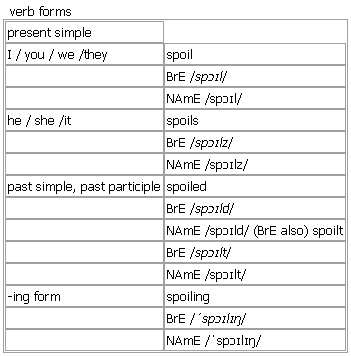 spoil
spoil

spoil [spoil spoils spoilt spoiled spoiling] verb, noun BrE [spɔɪl] NAmE [spɔɪl]
verb (spoiled, spoiledBrE [spɔɪld] ; NAmE [spɔɪld] )(BrE also spoilt, spoiltBrE [spɔɪlt] ; NAmE [spɔɪlt] )
1. transitive ~ sth to change sth good into sth bad, unpleasant, useless, etc.
Syn: ↑ruin
• Our camping trip was spoilt by bad weather.
• Don't let him spoil your evening.
•The tall buildings have spoiled the view.
•Don't eat too many nuts— you'll spoil your appetite (= will no longer be hungry at the proper time to eat).
• (BrE)spoiled ballot papers (= not valid because not correctly marked)
•I won't tell you what happens in the last chapter— I don't want to spoil it for you.
2. transitive ~ sb to give a child everything that they ask for and not enough discipline in a way that has a bad effect on their character and behaviour
Syn: ↑overindulge
• She spoils those kids of hers.
3. transitive ~ sb/yourself to make sb/yourself happy by doing sth special
• Why not spoil yourself with a weekend in a top hotel?
• He really spoiled me on my birthday.
4. intransitive (of food)to become bad so that it can no longer be eaten
Syn: ↑go off
more at too many cooks spoil the broth at ↑cook n.
Verb forms: 
Word Origin:
Middle English (in the sense ‘to plunder’): shortening of Old French espoille (noun), espoillier (verb), from Latin spoliare, from spolium ‘plunder, skin stripped from an animal’, or a shortening of ↑despoil.
Thesaurus:
spoil verb T
•I don't want to spoil your fun, but it's time to go.
ruin • • wreck • • mar •
spoil/ruin/wreck sth for sb
spoil/ruin/wreck things/everything
spoil/ruin/wreck sb's plans/day/evening/life/chances/hope
Spoil or ruin? Ruin is stronger than spoil. If sth is ruined it is completely spoiled. If sth is spoiled it may just be less good than it should be.
Example Bank:
•Don't let the bad weather spoil your trip.
•He spoils the children with expensive toys.
•Her selfish behaviour completely spoiled the evening.
•I don't want to spoil things for everyone else.
•It would be a pity to spoil the surprise.
•My grandparents used to spoil me rotten.
•Now, don't be hard on the children and spoil their fun!
•The bad weather really spoilt things for us.
•Those children are thoroughly spoiled!
•Why did they have to act so aggressively and spoil everything?
•Don't have anything to eat now— you'll spoil your appetite.
•I don't want to spoil your fun, but it's nearly time to go home.
•I won't tell you what happens in the last chapter— I don't want to spoil it for you.
•The new buildings have completely spoiled the view.
•The performance was spoilt by the constant noise from the audience.
•Why do you always have to spoil everything?
Idioms: ↑spoil the ship for a ha'p'orth of tar ▪ ↑spoiling for a fight
noun
1. the spoilsplural (formal or literary)goods taken from a place by thieves or by an army that has won a battle or war
•the spoils of war
•The robbers divided up the spoils.
2. spoilsplural the profits or advantages that sb gets from being successful
•the spoils of high office
•The two teams shared the spoils with a 1–1 result.
3. uncountable (technical)waste material that is brought up when a hole is dug, etc.
Word Origin:
Middle English (in the sense ‘to plunder’): shortening of Old French espoille (noun), espoillier (verb), from Latin spoliare, from spolium ‘plunder, skin stripped from an animal’, or a shortening of ↑despoil.
|
|
